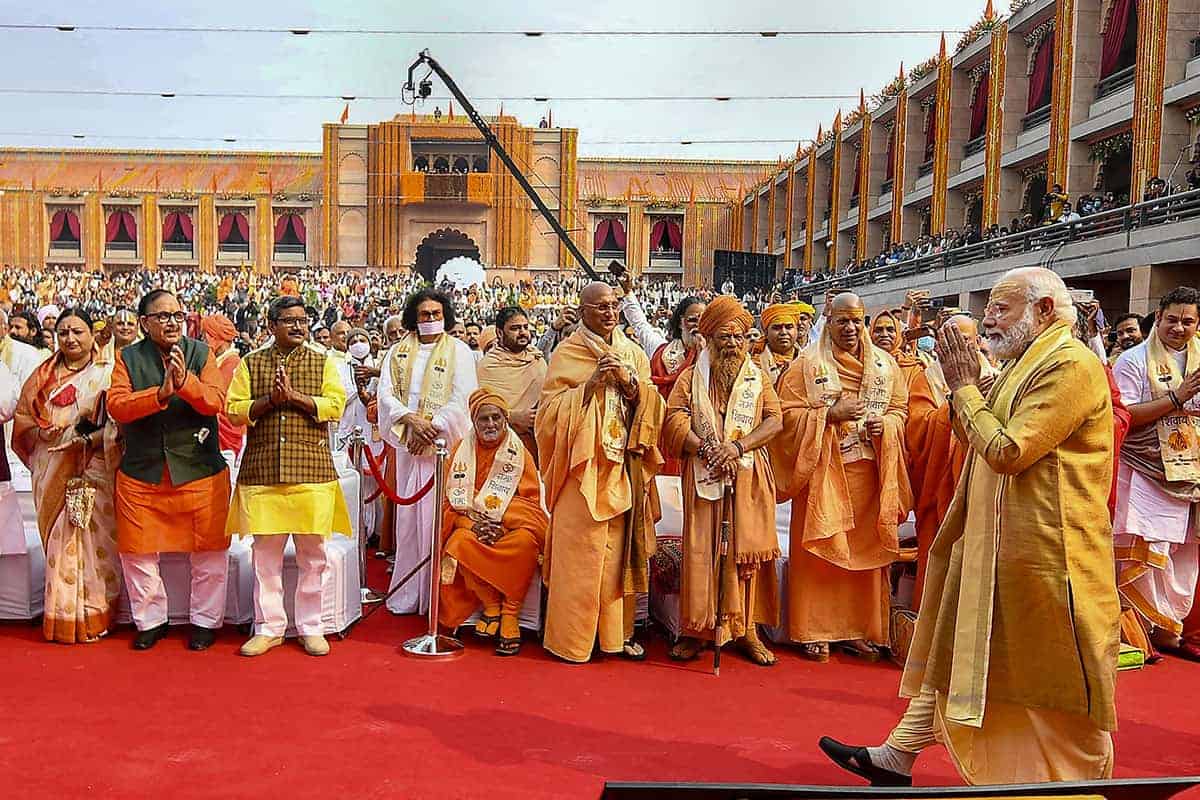Varanasi: Lauding the resilience of India’s civilisational heritage here, Prime Minister Narendra Modi said on Monday that tyrants like Aurangzeb tried to destroy it but were consigned to “black pages” of history while the ancient holy city of Kashi is writing a new chapter of its glory.
In a speech after inaugurating the Kashi Vishwanath Dham, which has renovated and expanded the temple’s premises, Modi said India is now stepping out of the influence and “inferiority” complex brought on it by centuries of slavery and asserted that the new corridor will give a decisive direction to the country and lead it to a bright future.
A new history is being created, he said, asserting that if an Aurangzeb came, a Shivaji also rose and if a Salar Masud, a Muslim invader, marched, then a Raja Suheldev took him on.
Modi dwelt at length about the glory of the city’s heritage and noted that it withstood attempts to destroy it by the likes of Mughal king Aurangzeb, Muslim invader Salar Masud and Warren Hastings, British governor-general in India.
Sultanates rose and fell but Benaras remained, he said, often referring to the city with its different names, including Kashi.
“Tyrants attacked this city, tried to destroy it. History is witness to Aurangzeb’s atrocities, his terror. He tried to change civilisation with the sword. He tried to crush culture with fanaticism.
“‘But the soil of this country is different from the rest of the world. Here if an Aurangzeb comes, a Shivaji also rises,” Modi said, while raising the chant of ‘Har Har Mahadev’, associated with Lord Shiva, several times.
“If a Salar Masud marches on, warriors like Raja Suheldev make him realise the power of our unity,” he said. People of Varanasi forced Hastings to escape on an elephant’s back.
“See how the time changes. Today, those synonymous with terror have been consigned to the black pages of history while my Kashi marches ahead and is writing a new chapter of its glory,” the prime minister said, adding that whenever the city has taken a turn, the country’s fate has also changed.
Many historians believe that Aurangzeb had ordered pulling down the temple to build a mosque. Modi also lauded Rani Ahilyabai for rebuilding the temple and Sikh king Ranjit Singh for gold plating its domes.
Modi said the whole new complex of the Kashi Vishwanath Dham is not just a grand building, but a symbol of the “Sanatan culture” of India, its spiritual soul antiquity and traditions.
If India is building Ram Temple, Kashi Vishwanath Dham, it is also laying down thousands of kilometers of optical fibres in sea, building millions of houses for the poor and is working to send people to space, the prime minister said.
He also noted the work done on Buddhist and Sikh pilgrimage centres among others.
“The new India has heritage as well as development. It is not only proud of its culture but has equal belief in its capabilities,” he said.
The premises, he said, is a confluence of the ancient and new. It is a testimony to ”our capabilities and nothing is impossible if there is a firm resolve”.
“The strength of destroyers can never be bigger than India’s ‘shakti’ and ‘bhakti’. The world will look at us in the same way we look at ourselves,” he said.
Prime Minister Modi also urged people to commit themselves to ‘swachhta’ (cleanliness), ‘srijan’ (creation and innovation) and continuous efforts for ‘aatmanirbhar’ (self-reliant) India.
The prime minister said cleanliness is a way of life and called for people’s participation in this enterprise, especially in the Namami Gange Mission.
Underlining that the long period of slavery “broke our confidence in such a way that we lost faith in our creation”, Modi said, “Today, from this thousand-year-old Kashi, I call upon every countryman — create with full confidence, innovate.”
The prime minister said that the third resolution that needs to be taken is to raise efforts for a self-reliant India.
“In this Amrit Kaal’, in the 75th year of independence, we will have to work for what India will be like when India celebrates a hundred years of independence,” he said.
The prime minister noted that earlier the Kashi Vishwanath temple area was only 3000 square feet which has now enlarged to about 5 lakh square feet. Now 50,000-75,000 devotees can visit the temple and its premises.
Dwelling on the glory of Kashi, the prime minister said that the city is “imperishable” and is under the patronage of Lord Shiva.
Modi also expressed his gratitude to workers involved in the construction of the grand temple complex, noting that they did not let even COVID stop the work here. He met and felicitated the workers by showering them with flower petals. He had lunch with them later as well.
He also spoke in a local dialect during his speech a few times.
After arriving in the holy city, also his parliamentary constituency, Modi paid obeisance at the Kaal Bhairav Temple and then took a dip in the river Ganga from where he collected holy water for worship at the Kashi Vishwanath Temple.
People chanted hymns as the prime minister’s carcade rolled through the city. Modi also stopped at one place to accept felicitation.
Uttar Pradesh Chief Minister Yogi Adityanath, BJP president J P Nadda and hundreds of seers and saints invited from across the country besides other dignitaries attended the ceremony.

